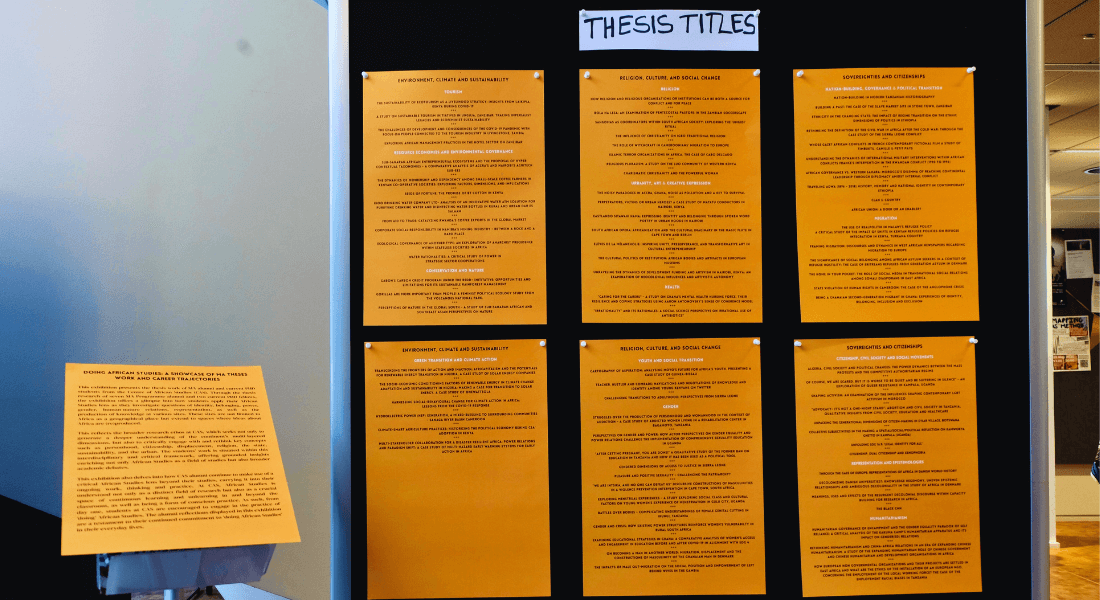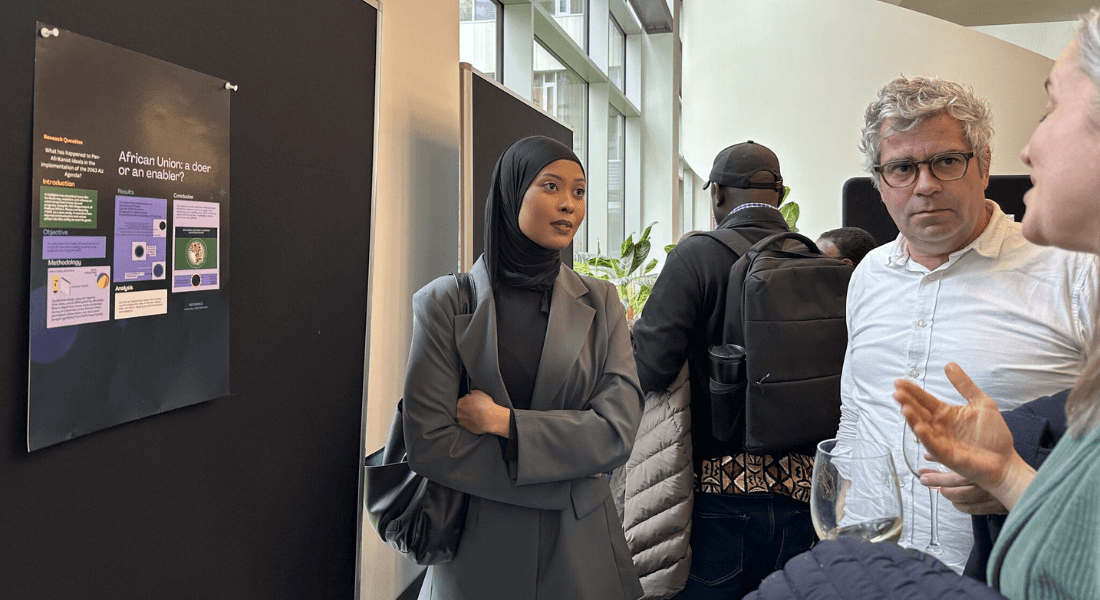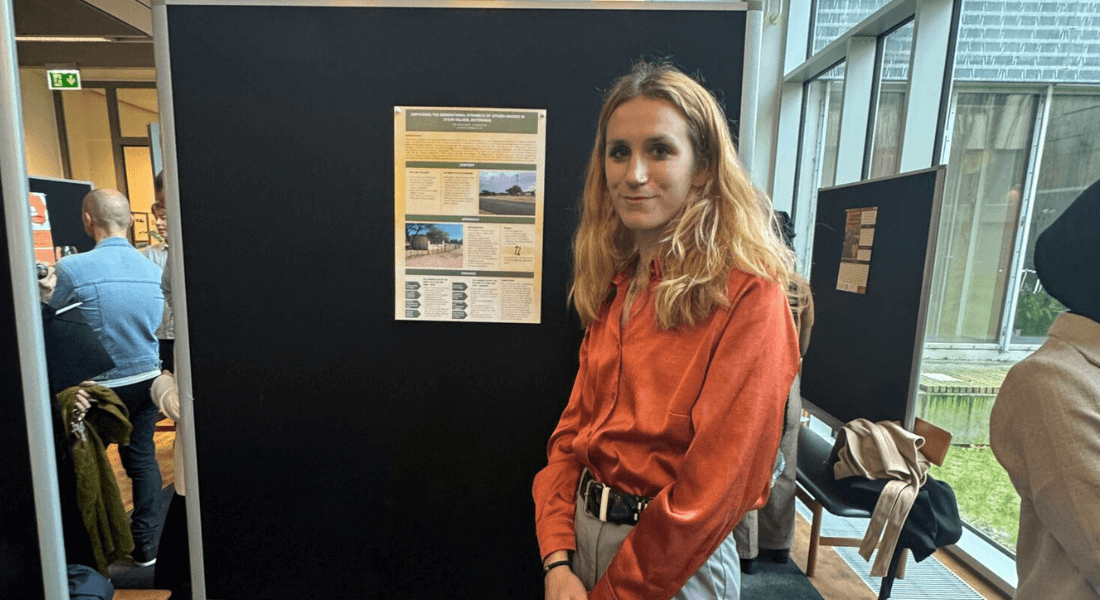A Recap of the MA Thesis Research Exhibition at CAS' 40th anniversary

By Eva Steinhorst
On April 25th, the Centre of African Studies (CAS) marked a significant milestone - its 40th anniversary. This wasn’t merely a commemoration of years gone by, it was a celebration of intellectual journeys, evolving ideas, and the enduring importance of African Studies as a discipline.
As part of the anniversary event programme, ten alumni from the MA programme, including two current PhD fellows at CAS, returned to present their MA thesis research in a poster exhibition. This showcase offered a glimpse into how students apply their African Studies lens as they investigate questions of belonging, power, human-nature relations, representation, as well as the production of knowledge at various sites.
An anniversary is not just a moment to count or acknowledge the years that have passed, but also a moment to look inward and forward. They invite reflection on the past and contemplation of the future. Central to this was a compelling keynote lecture delivered by Professor Taah Abongnelaa Divine Fuh based at the University of Cape Town. His lecture titled “Africa as Theory” tackled the question of what African Studies can offer - especially at this particular time - advocating for an African Studies centred around Africa not as a geographic place but as a source of theory. In so doing, Professor Divine Fuh made the case for decoloniality as not just a critique, but as a transformative project, or in other words, a paradigm shift centred around the idea of pluriversality, where multiple perspectives can coexist.

For the alumni, revisiting their research was also a moment for reflection. Aisha Mohammed, who graduated from CAS in 2023, was one of them. Drawing from her internship at the African Union’s department of Political Affairs, Peace and Security (PAPS), she examined the impact of practical norms on the African Union’s ability to achieve the goals set out in Agenda 2063.
Reflecting on the experience, Aisha shared:
“Revisiting my research in a public setting after some time felt both grounding and revitalizing. It reminded me of the questions that first sparked my curiosity and allowed me to view my work with fresh eyes through the insightful conversations I had with visitors. The exhibition felt like an extension of the learning journey, where knowledge was shared and reshaped in real-time. Sharing it in such a reflective environment helped me appreciate its continued resonance and reminded me why I pursued this path in the first place.”
Asked whether Professor Fuh’s lecture shifted her thinking, she responded:
“His emphasis on pluriversality and decolonizing knowledge reminded me that our research is never static - it must be in constant dialogue with the world. It challenged me to think more expansively about whose voices I center and how I can remain open to unlearning and relearning.”
 Another 2023 alumna who presented her research was Simona Bianchi, who is now a PhD fellow in the project Multiple Waterscapes in Urban Ghana. Her research focused on how women in Kinigi, Rwanda experience the expansion of the Volcanoes National Park, offering a gendered perspective that nuances mainstream narratives around conservation in Rwanda.
Another 2023 alumna who presented her research was Simona Bianchi, who is now a PhD fellow in the project Multiple Waterscapes in Urban Ghana. Her research focused on how women in Kinigi, Rwanda experience the expansion of the Volcanoes National Park, offering a gendered perspective that nuances mainstream narratives around conservation in Rwanda.
For Simona, revisiting her thesis highlighted how much her thinking had evolved since completing her MA.
“Indeed, it wasn’t the first time I returned to my MA thesis - I revisited it while drafting my current project. But this time, after a few months into the PhD, I approached it with deeper understanding and new clarity. Adapting my work for a broader audience helped distill its core messages and reminded me why I’m so passionate about what I do: shaking the comfortable truths upon which societies lazily rest.”

Meanwhile, for Eva Steinhorst, who organized the exhibition and presented her research on intergenerational dynamics of citizen-making in an Indigenous community in Botswana, her MA project in and of itself was a return to themes explored in her Bachelor’s thesis. A highlight of the exhibition was engaging with scholars from various disciplines. These conversations revealed how African Studies can challenge and renew thinking across fields beyond its own.
All in all, the exhibition was a testimony to the richness, originality, and diversity of the research projects students embark on during their studies. The reflections from alumni echoed Professor Divine Fuh’s vision for African Studies - one where knowledge is not fixed but dynamic, situated, and coexisting across multiple sites.
